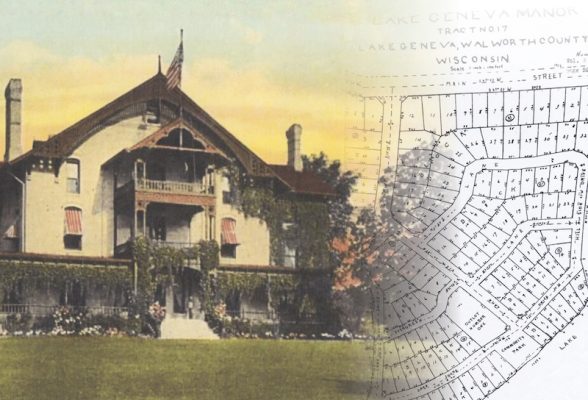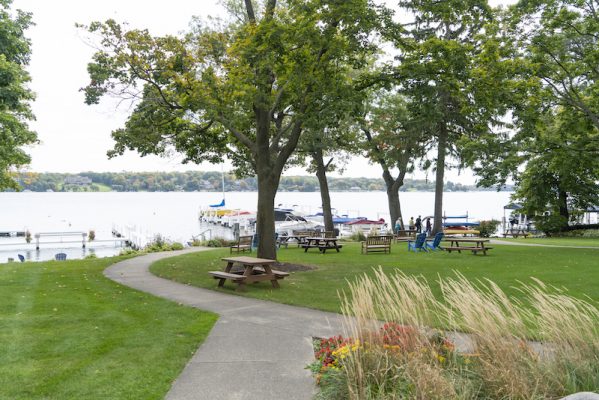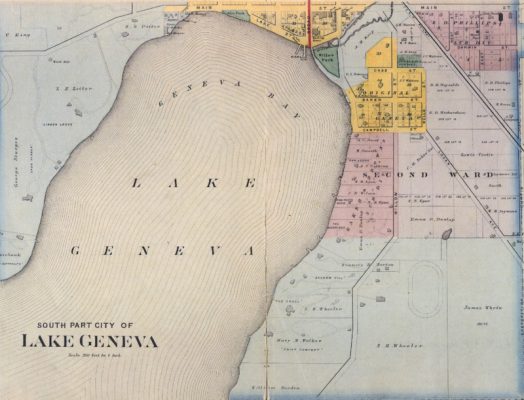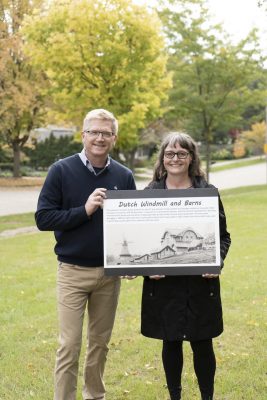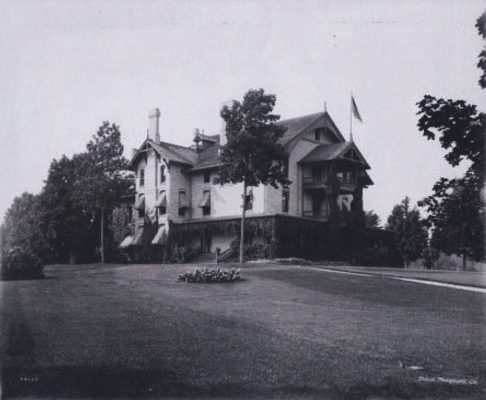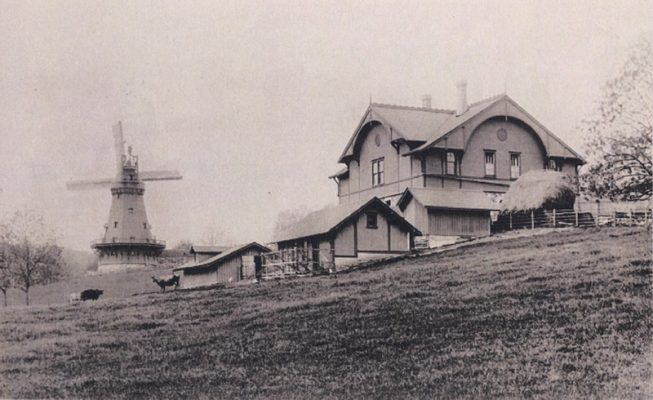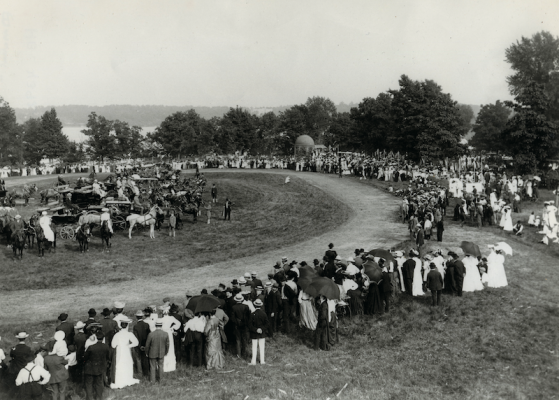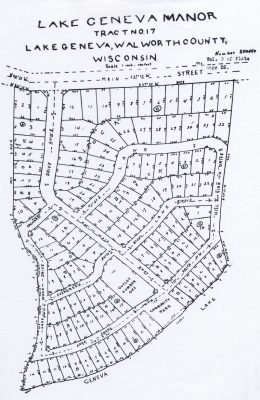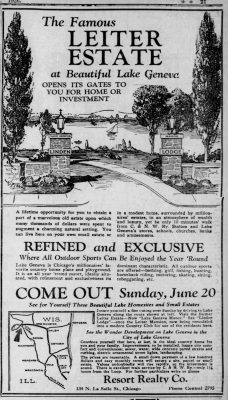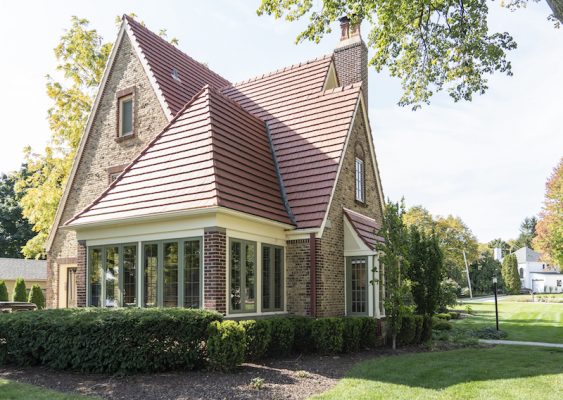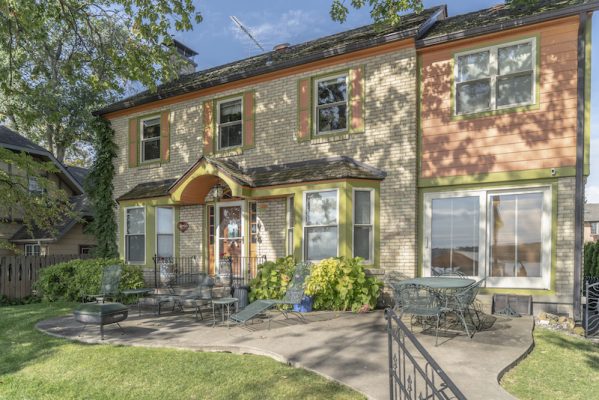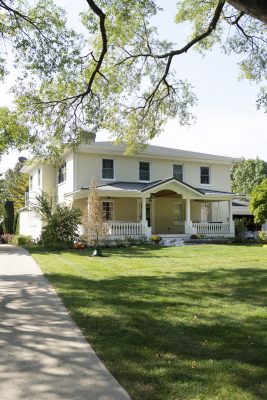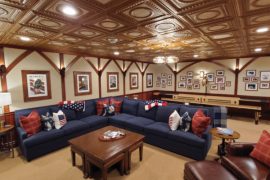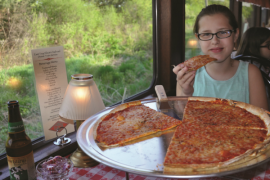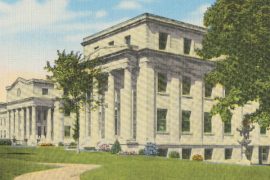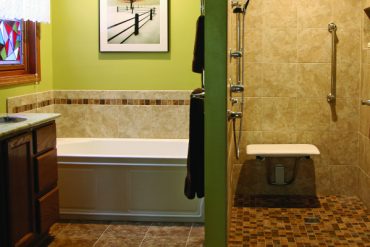By Anne Morrissy | Opening photo courtesy Geneva Lake Museum
From the age of 18, Andy Kerwin spent summers in Lake Geneva and knew about the Lake Geneva Manor, a lakefront neighborhood west of Library Park, but it wasn’t until he purchased a home in “the Manor” (as residents call it) in 2013 that he started wondering about its history. How long had the Manor been around? What was located on that prime lakefront land prior to its development? Kerwin started asking his new neighbors what they knew about the Manor’s history, and discovered a wealth of knowledge. Many families had lived in the Manor for several generations, and everyone seemed to know each other, as well as the history of their properties and their neighbors’ properties. Very quickly, Kerwin realized there were endless stories to dig into, and he wanted to learn more.
So Kerwin reached out to his friend Sonja Akright, a local researcher and historian with years of experience doing just this sort of project. Akright is a member of the Lake Geneva Historic Preservation Committee and sits on the board of the Geneva Lake Museum. She had plenty of resources at her fingertips to help Kerwin and the other residents of the Manor dig into the neighborhood’s history. “I knew Sonja was the perfect person for this project,” Kerwin says. “She jumped right in.” Over several months, Akright compiled a hefty binder full of research from historic newspapers, museum archives and rare books, and together, she and Kerwin created posterboard presentations to share with the members of the Lake Geneva Manor Association. It turned out that was just the beginning of what would eventually become a neighborhood-wide celebration of the Manor’s storied history.
LINDEN LODGE
In the 19th century, the property that would one day become the Lake Geneva Manor was owned by Levi Leiter, the early partner of department store founder Marshall Field. The two met as clerks in a wholesale drapery store, and together they purchased a controlling interest in a dry goods store owned by another famous Chicagoan, Potter Palmer, changing the name of the store to Field, Leiter & Co., in 1867. Although they lost $2.5 million in merchandise to the Great Chicago Fire in 1871, they reopened their store 18 months later. Leiter also took the opportunity to buy up tracts of burned real estate at a low price, helping to make him a very wealthy man as the city quickly began to rebuild.
As early as the summer of 1877, Leiter and his family — wife Mary and their children, Joseph, Mary Victoria and Nannie (daughter Daisy would arrive in 1880) — spent time in Lake Geneva. They enjoyed the lake so much that Leiter eventually purchased land directly to the east of Maple Lawn, the estate owned by the Sturges family, and began building a summer home. The Leiter estate, named Linden Lodge, was completed in 1880. The three-story house was built of cream-colored brick in a style vaguely reminiscent of a Swiss cottage, with a wide veranda. The home boasted 37 rooms, most featuring ornately carved woodwork interiors: a first-floor ballroom, a large square reception hall with drawing rooms on either side, a music room, a dining room and multiple subterranean wine cellars, among many other luxuries. There were a total of 19 fireplaces and multiple oversized, footed bathtubs. On the property surrounding the house, Leiter constructed a large barn for the care of the estate’s 600 chickens, 100 head of sheep and small assortment of Jersey cattle. One of the most distinctive elements of the Leiter estate was the sizable Dutch windmill constructed behind the main house. (Akright says that local residents particularly disliked the windmill, which was located close to the road and tended to spook their horses.)
For several years after building Linden Lodge, the Leiter family became a fixture of the Lake Geneva summer social scene, and their yacht, the Daisy, was a common sight on the lake. Beginning in 1904, the estate hosted the Mid-Summer Fair, recreating the scene of an English country fair, complete with livestock judging and a competitive horticulture competition. The Mid-Summer Fair raised funds for Holiday Home Camp, which the Leiters and many other early summer residents strongly supported. For many years, the fair was a highlight of the summer social season in Lake Geneva.
However, as the Leiter children grew up and moved away (their daughters famously married into the British aristocracy), Levi and Mary Leiter began spending less time at Linden Lodge. Leiter’s partnership with Marshall Field had dissolved in 1881, and he spent the remainder of his life monitoring his vast investments, devoting his time to philanthropy and travel. When Levi Leiter died in 1904, the estate passed to his wife Mary, who allowed her sister and brother-in-law to use it. When Mary died in 1913, ownership of Linden Lodge transferred to their son Joseph and the estate’s trustees.
THE 1920S: THE FIRST ATTEMPT AT DEVELOPMENT
By the early 1920s, after several years of trying to sell the estate intact, Joseph Leiter sold the property to a Chicago real estate development company, which platted the land to become a neighborhood, adding roads and subdividing the land into buildable lots. A notice in the Lake Geneva Regional News of June 10, 1926, announced, “The famous Leiter estate at beautiful Lake Geneva opens its gate to you for home or investment,” and featured an artist’s rendering of Linden Lodge’s stone gates and a view of the lake beyond.
The notice featured the first mention of the subdivision’s new name — Lake Geneva Manor — and boasted that in addition to offering nearly 80 lots in the neighborhood, the developers also intended to preserve the main house and convert it for use as a private clubhouse, with a ballroom, a dining room, several lounging rooms and 50 guest rooms. They set aside the land between the main house and the lake as a community park, a space that remains to this today.
According to Akright and Kerwin’s research, a handful of properties — including most of the lakefront lots — were purchased as part of that initial sale, and houses began appearing in the new subdivision around 1928. However, the stock market crash the following year stalled sales and many of the lots remained unsold. Following an initial remodeling project, Linden Lodge’s main house was purchased by a group of Chicago businessmen who renamed it the Linden Lodge Country Club and used it as a private club during the Depression, but eventually failed to pay their property taxes and lost ownership.
WILLIAM F. TRINKE AND A NEW HOUSING BOOM
In 1939, a local attorney named William F. Trinke purchased the clubhouse and the unsold lots in the Manor from the county after they had been seized for unpaid taxes. He spent $10,000 to acquire it all, and then demolished the clubhouse and invested in a new community pier and boat landing to entice people to purchase the lots. His real estate investment plan worked, and several new homes were built in the neighborhood in the 1940s. (Trinke would go on to develop other subdivisions in the area, including one on the lake’s south shore that still bears his name: Trinke Estates.) Then when World War II ended, the “baby boom” led to a housing shortage that further spurred sales in subdivisions like the Lake Geneva Manor. As a result, the decades of the 1950s and 1960s saw the highest rate of new construction in the Lake Geneva Manor, including homes in both classic and mid-century modern styles.
Jim McCullough’s family moved into a house in the Manor in 1958, after his father bought a drugstore in downtown Lake Geneva. Over the years, McCullough has lived in three different houses in the Manor and remains a resident to this day. He remembers the Manor in the 1950s as a friendly community of local families, much as it remains today.“When we were kids,we would mow an empty lot across from our house so we could use it to play ball,” he remembers. “Then if that lot was sold and they started building a house, we’d move to the next empty lot.”
LAKE GENEVA MANOR TODAY
Today, the Manor remains an exceptionally friendly neighborhood of about 80 homes, and many families in the Manor have lived there for two, three and even four generations. When asked what facilitates the unusually high degree of camaraderie in the neighborhood, former Lake Geneva Manor Association President Tykee Green cites the central lakefront park that draws people out of their homes to connect and interact with each other.
“The community park is the secret ingredient,” she says. The association makes use of the park for events like a Fourth of July bike parade and party each summer, and a Halloween party to coincide with trick-or-treating.
And since Kerwin and Akright began their project five years ago, the neighborhood has been celebrating its history as well. In 2017, Kerwin and Akright, along with Manor resident Carol Zimmermann, organized “Leiter Days,” with local costumed docents Dave Merhar and Chris Brookes portraying Levi and Mary Leiter for a presentation on the property’s history, and a guided walking tour of the neighborhood. The tour included stops at homes in the Manor that were constructed using bricks from the original Leiter home, repurposed when the house was razed in 1939.
The tour also highlighted a house in the neighborhood that was built over the original home’s foundation, and contains a vault in the basement that was once used by the Leiters. Perhaps most uniquely, the walking tour included a stop at the site of a pair of elaborate gravestones marking the final resting place of Daisy Leiter’s beloved Japanese spaniels, Naezan and Chiko San. “We read about the gravestones in an old newspaper article, and went looking for them,” Akright explains. “We couldn’t believe it when we found them covered in grass in someone’s backyard.”
As the 100th anniversary of the founding of the Lake Geneva Manor nears, Kerwin and Akright say they hope to celebrate with a neighborhood party and a new iteration of Leiter Days. “There’s just something special about this neighborhood,” Kerwin explains. “It’s the history, it’s the location, it’s the park, it’s the people. It’s a truly wonderful place to live.”

